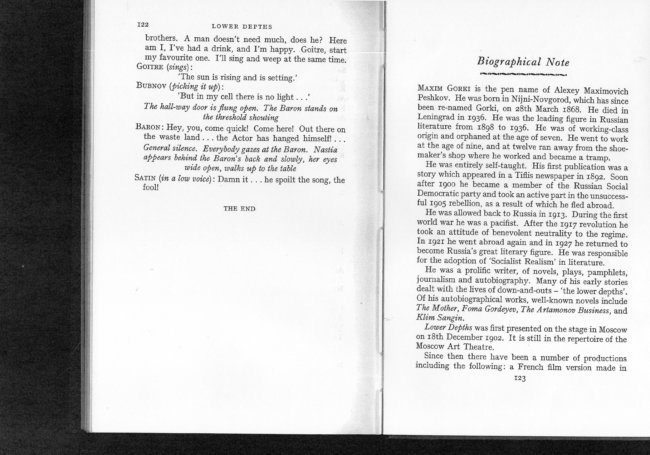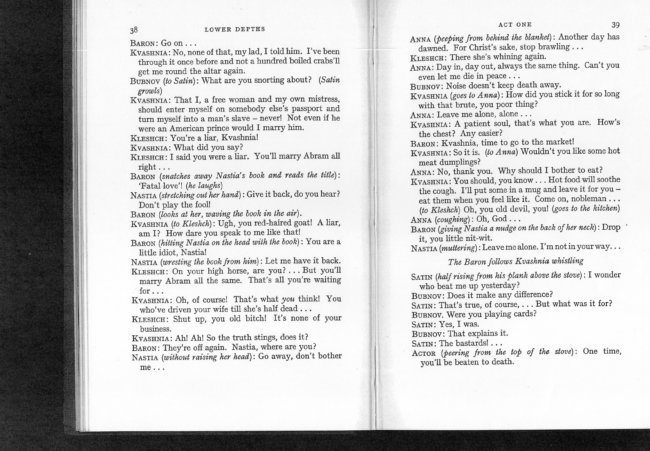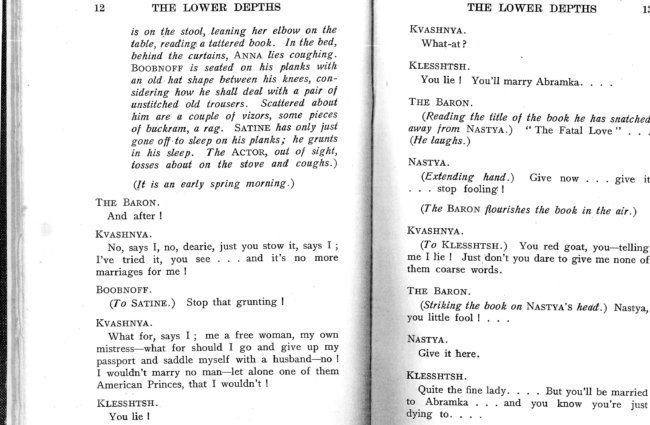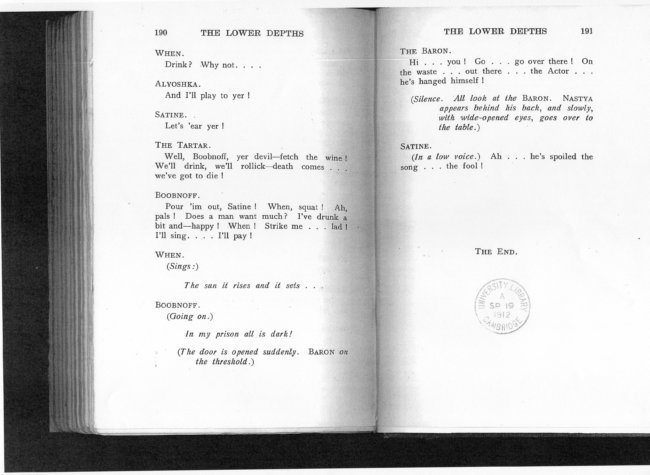Kitty Hunter Blair and Jeremy Brooks’ translation of The Lower Depths was first performed by the Royal Shakespeare Company on 29 June 1972. 100 years after the Russian Revolution, it’s back on stage in our production of The Lower Depths, directed by Helena Kaut-Howson.
In this exclusive article, Kitty Hunter Blair talks about the process of translating Russian plays, and more specifically The Lower Depths, and shares her thoughts on the production.
WORDS, WORDS, WORDS:
Some random thoughts on The Lower Depths
Below are the opening and final pages of two earlier translations, one from Laurence Irving’s version of 1912, and the other from 1959 by Kurt Klein and Ira Goetz with an introduction by Baroness Moura Budberg, Gorky’s mistress (lover also, incidentally, of H.G.Wells).
The ineptitude of much of the 1912 version is obvious. Apart from its inaccuracies, the text is made hard to read by the phonetically spelt, and unsystematic, phoney demotic speech, and considerations of register are pretty well ignored. As a result many of the characters’ utterances are improbable – for instance, Klesshtsh’s melodramatic ‘You lie!’, or Nastia’s pigeon ‘Give now’. I assumed that the library copy I found must be a bibliographical curiosity, but Google reveals, amazingly, that this translation is available online in a recent US reprint, has been used in a production in Edinburgh that was much praised. It apparently ‘worked’, despite everything, which is food for thought.
The 1959 version is largely accurate, if not very nuanced, and quite worth comparing with Jeremy’s and mine. There’s a huge number of other translations.
It was my extraordinary good fortune to work with Jeremy, who was a poet, novelist and playwright and for several years Literary Manager of the RSC; and he had what he called ‘a love affair with the English language’. I have an equivalent love affair with Russian, which may be atavistic: I’m half-Russian, but only started to learn the language at Oxford and have been learning ever since.
We complemented each other satisfactorily. Section by section I would produce a literal version with notes about the register and associations of particular words or phrases, on how usual, colourful or clichéd they were; Jeremy would write what an equivalent English character might say. Then we engaged happily in ‘horse-trading’. We aimed at dialogue that kept something of its Russian colour, without being in any way exotic, an idiom that would sound natural to a 1970s audience but lose as little as possible of the original imagery and realia. Jeremy’s gift for dialogue was remarkable, it was exciting to watch the characters come alive and individual under his hand. There were occasions when Jeremy, whose sense of language and knowledge of the world were far more developed than mine, understood things in Russian that defeated me, for instance (not in Lower Depths) why ‘you old horse radish’ should be an insult, the answer being that it’s shape suggests ‘prick’.
The first word of the play, the Baron’s ‘Further’, is not very usual in English in the sense used here, but common in everyday Russian. The repetition was introduced by Jeremy, and its effect is subtly to accustom the ear: the meaning is instantly clear, and at the same time there’s a faint sense of surprise – one wants to know what happened next. The 1912 ‘And after!’ makes little sense as it stands; the 1959 – ‘Go on …’ is ambiguous, it could suggest either disbelief or encouragement. When Kvashnia hurries the Baron off to the market, she says in our version, ‘Come on, your lordship’ – exactly the right tone, it could be ironic, and is common jokey English parlance. 1959 has ‘Come on, nobleman’ – by comparison a bit stilted and unlikely. And 1912: ‘Baron’, a misreading for the Russian ‘barin’, ‘gentleman’ or ‘squire’; the latter could in fact be a good solution, but would lack the pleasing irony of ‘lordship’.
Kvashnia’s outburst against marriage threw up the problem of the ceremonial crown held over the bride’s head in the Orthodox ceremony, which we solved with ‘bridal veil’; 1959 has ‘get me round the altar’ – which is not physically possible in a Russian church and therefore conjures up no picture.
In the final scene, among the gathered drunks is one called Krivoi Zob, which in our version is left in the original, I now have no recollection of how or why, and can only assume that I failed to make sense of it. (forty years ago I knew less Russian then than I do now). The 1959 calls him Goitre, in Russian ‘zob’, but this is also the word for a bird’s crop; krivoi= squint, crooked. Crooked Crop? Ugly Gizzard? One could have a happy time finding a brilliant solution, unfortunately we failed to do so at the time. The 1912, incomprehensibly, calls him ‘WHEN’.
I have known the play for something like 65 years, and have always admired its grim truthfulness. The Arcola production brings out a realism that goes well beyond social comment, though it is naturally the social significance of the play that attracts the most attention. Two things struck me forcefully in this fine production.
First, the spoken word and the ways in which it is used and abused. The Actor’s gift for utterance is degenerating, words no longer come when he wants them, his very self is being lost: ‘words, words, words’ is a cry of despair. Satin invents words, deforms them, boasts of the number he knows through working with telegrams (other people’s starkly brief messages) and the clever books he has read, but his own words are empty shells. Gorky observed that Satin was not the right character to deliver the monologue about Man, but the speech had to be made and there was no-one else to make it, a fascinatingly ambiguous comment on the author’s part. Characters constantly accuse each other of lying. Kostyliov uses pious platitudes to create his benefactor image which deceives no-one. Luka tells people what they want to hear, exploiting their vulnerability because their gratitude is flattering, and he enjoys his invented persona. Pace more than one reviewer, he is neither saintly nor Christ-like and has nothing in common with Dostoievsky’s Prince Myshkin – though he does indeed remind one of Alan Bennet. Vaska Pepel, thief and womaniser and the one honest character, is alone in wanting to hear things ‘as they are’. His true love for Natasha is doomed because she can no longer believe anyone’s words – ironically she is able to accept Vassilissa’s slander but not Vaska’s declaration. The Baron is not believed when he gives his fellow-residents a perfectly truthful account of his noble lineage and earlier wealthy life style.
Second, the closing scene. After all the lies, deceit, self-deceit, cruelty, violence and tragedy, when everyone is about to let their hair down, singing, drinking, and weeping, comes the extraordinary – I’m tempted to say sublime – moment, when the Actor’s death unites them in awed silence, as they slowly remove their hats. In all their vulnerability the group is lent a scintilla of humanity, compassion, dignity. There’s no arguing with death, it defies comment, but the silence of its reality is too much for Satin (and probably for the rest of them) and he breaks it after a few seconds. It’s unlikely that Gorky himself would have spoken of the ending in positive terms. He saw his writing above all as a political task, fuelled by anger and the thirst for justice. However, his characters are based on people he knew, amongst whom he lived, and whose language he spoke. By contrast, his other plays, all resolutely didactic, are peopled by middle or merchant class characters, whom he knew at a more shallow level and to whom he did not belong. In this play his acute observation of human behaviour in extremis is informed by a more profound realism, evident in this cathartic instant of silence.
……………………………………………………………………………………………………………..
Stanislavsky was obliged to cleanse the text of improper language before it could be staged; we can assume that this production restores it to something approaching its original idiom.
(A tiny point: if political correctness precludes the use of the word ‘Man’, in the sense of humanity as a whole, could it not be rendered ‘humanity’ rather than the more abstract ‘humankind’?




The Lower Depths, part of Arcola’s Revolution Season, will be on stage until 11 February. Book your tickets now.

